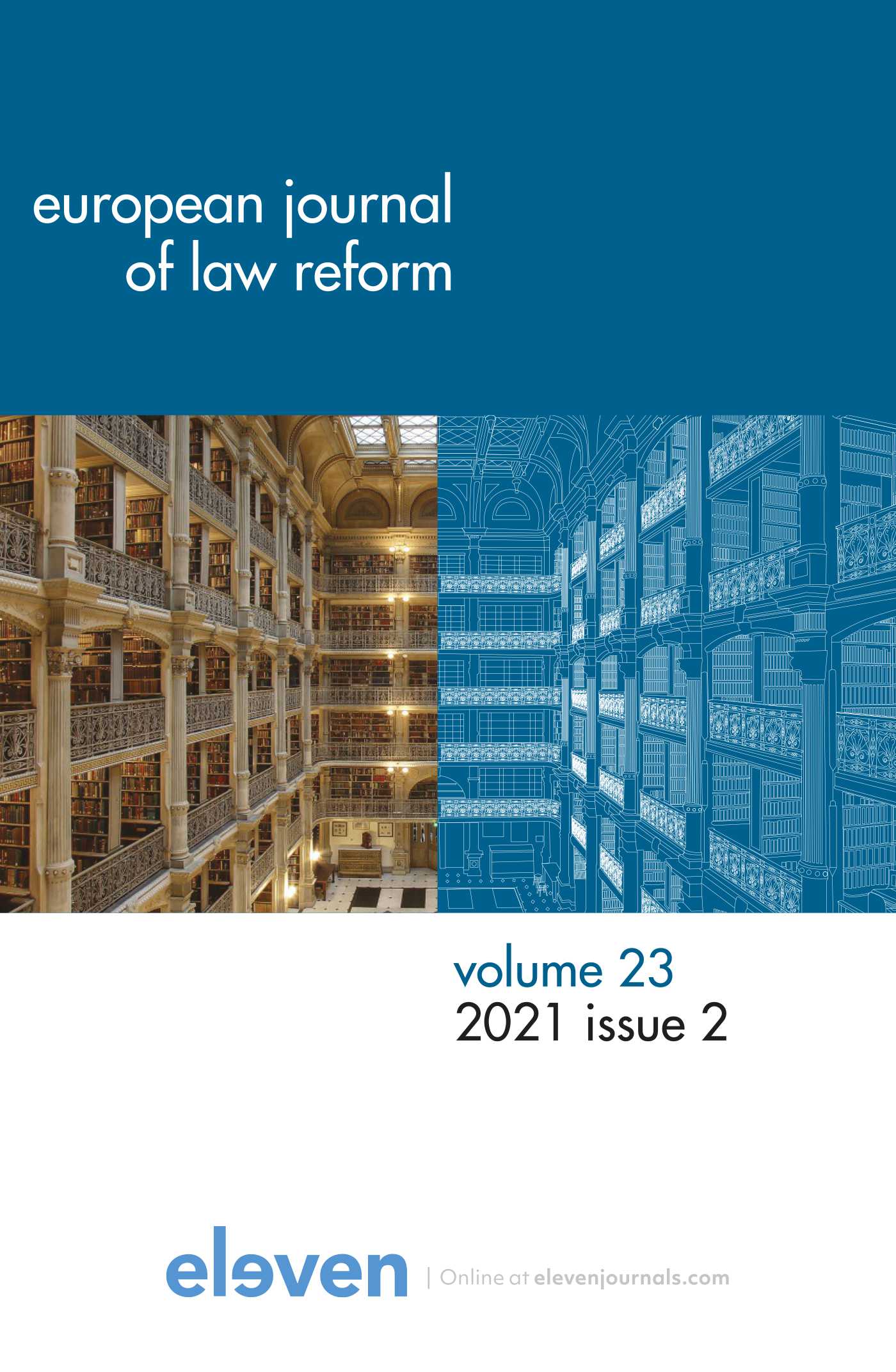|
This report is the result of the collective work of 26 Rwandan civil servants from a number of ministries, who set out to offer the Ministry of Justice a report on legislative drafting in Rwanda. The work was undertaken under the umbrella of the Diploma in Legislative Drafting offered by the Institute for Legal Professional Development (ILPD) in Nyanza under the rectorship of Prof. Nick Johnson. The authors have used their experience of practising drafting in Rwanda, but have contributed to the report in their personal capacity: their views are personal and do not reflect those of the Government of Rwanda. |


European Journal of Law Reform
About this journalSubscribe to the email alerts for this journal here to receive notifications when a new issue is at your disposal.
| Editorial |
|
| Authors | Cherie Booth and Helen Xanthaki |
| Author's information |
| Article |
|
| Keywords | legislative drafting, law-making, drafting techniques, Rwanda, quality of legislation |
| Authors | Helen Xanthaki |
| AbstractAuthor's information |
| Article |
|
| Keywords | drafter, drafting process, techniques, scrutiny |
| Authors | Mico Augustin |
| AbstractAuthor's information |
|
Every government needs legislation to cover all issues transposing obligations in the manner required by the initiator and with respect to constitutional obligations and rules that provide for the conduct of society. |
| Article |
|
| Keywords | retrospectivity, clarity, precision, unambiguity, legislative drafting |
| Authors | Elias Turatsinze |
| AbstractAuthor's information |
|
The hypothesis of this paper is that clarity, precision and unambiguity are the essential tools for expressing retrospective intent, which is a pre-requisite for quality and validity of retrospective legislation. The main objective of this work is to show that retrospective laws are valid, if the retrospective intent is expressed in clear, precise and unambiguous words within the statute. The term retrospectivity is used broadly to describe any legislation or decision affecting pre-enacting conduct. It encompasses statutes affecting the pre-enactment events, administrative regulations or decisions which look back in time and judicial decisions that overturn prior decisions. All these areas cannot be covered in this limited piece of work. Thus, the emphasis in this work will be put on retrospectivity of statutes at the drafting stage. Although it may be referred to generally, retrospective delegated legislation is outside the scope of this work. Particular attention will be directed towards the importance of clarity, precision and unambiguity in attaining quality and validity of retrospective legislation. |
| Article |
|
| Keywords | drafting, multilingual, translation, interpretation, authenticity |
| Authors | Odethie Birunga |
| AbstractAuthor's information |
|
Considering that every piece of legislation is subject to legal interpretation, its practicability depends highly on successful interpretation. In any legislation drafted in more than one language, divergence in meanings of versions is not only possible, but inevitable. It is not a simple task to draft in a way so that contexts are translated and included in all different language versions so that it becomes one meaningful legislation. While relying on one version only in the course of interpreting a piece of legislation may sound a lot easier, there could be ambiguous passages which may be clarified by consulting other versions. The existence of discrepancies between the versions of legislation is neither a smooth sail in multilingual environment. |
| Article |
|
| Keywords | ultra vires, administrative decisions, legislative drafting, validity and invalidity of local authority administrative decisions, misuse of discretion |
| Authors | Charles Aguma |
| AbstractAuthor's information |
|
The hypothesis of this article is that valid administrative decisions from local authorities are guaranteed via clear and precise enabling clauses in the primary legislation. The article argues that the style of drafting local authorities’ legislations influences decisions taken by local authorities. First, legislations need to be drafted in a style that clearly and precisely spells out the limits of powers of the local authorities in order to provide sufficient guidance to local authorities’ administrators to act lawfully. In attempting to exercise implied powers conferred by the imprecise enabling legislation, however, local authorities tend to go beyond intended legal powers and as a result take unreasonable, arbitrary and invalid decisions. More so, drafters rarely provide sufficient guidance about which considerations are properly relevant to the exercise of discretion and which are not. Secondly, obscure, wide and ambiguous enabling clauses in the primary legislations are substantial causes of courts’ misinterpretation of legislation as understanding the limits of the powers of the local authorities is a challenge. On the other hand, it is questionable whether the whole range of activities performed by a local authority by invoking implied powers, while exercising discretion, under the umbrella of doing anything that is calculated to facilitate or is conducive to or incidental to the discharge of any of its functions can be regarded as lawful. This article attempts to respond to that question. Although the principle of ultra vires requires the strict observance of the limits of the powers conferred in legislation, local authorities tend to invoke widely drafted provisions to perform activities that are said to be incidental to the express powers of which courts may declare invalid. |
| Article |
|
| Keywords | headings, legislative drafting, Rwanda, Australia, Horn |
| Authors | Samuel Ngirinshuti |
| AbstractAuthor's information |
|
The aim of this study is to prove that the use of section headings in legislation contributes to achieve effectiveness by helping readers of legislation find what they need to know faster, and understand it more easily. To prove the hypothesis, this study uses a comparative methodology by applying Horn’s criteria: Primary Users and Official Interpreters; Assistance for Primary Users; and Assistance for Official Interpreters. The study applies those criteria to Australian and Rwandan jurisdictions. |

 Issue 4
Issue 4